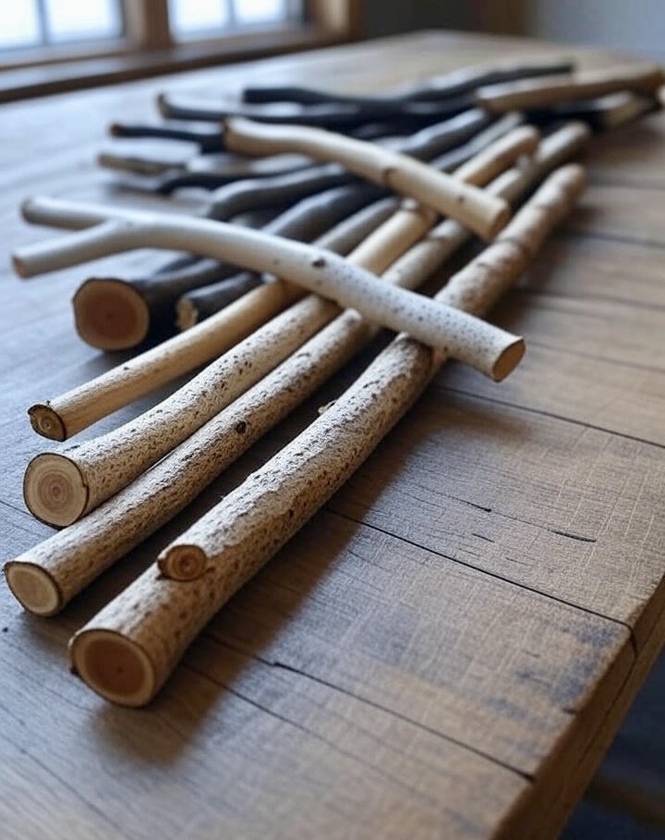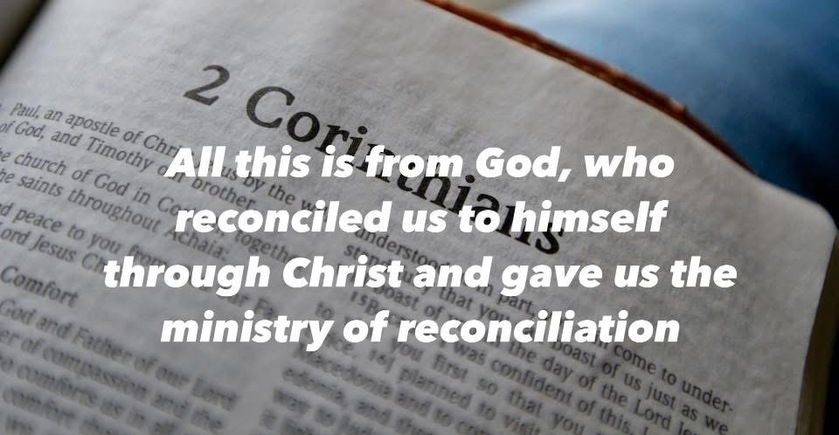Abiding in the Vine: Grafted, Pruned, and Proven – The Rings of Enduring Faith "in Christ"
John 15:1-9
"I am the true vine, and my Father is the vinedresser. Every branch in me that does not bear fruit he takes away, and every branch that does bear fruit he prunes, that it may bear more fruit. Already you are clean because of the word that I have spoken to you. Abide in me, and I in you. As the branch cannot bear fruit by itself, unless it abides in the vine, neither can you, unless you abide in me. I am the vine; you are the branches. Whoever abides in me and I in him, he it is that bears much fruit, for apart from me you can do nothing. If anyone does not abide in me he is thrown away like a branch and withers; and the branches are gathered, thrown into the fire, and burned. If you abide in me, and my words abide in you, ask whatever you wish, and it will be done for you. By this my Father is glorified, that you bear much fruit and so prove to be my disciples. As the Father has loved me, so have I loved you. Abide in my love."
Every human being who has ever lived has, or has had a "relationship" with Jesus Christ. And for most it's not been a good one.
You've heard this idea bantering about in Christian circles, this idea that a Christian can keep ordinances and sacramentalism, and likewise practice holiness, but those things aren't necessarily a "relationship" with Jesus Christ. You've probably heard "it's not religion it's relationship".
But what does it truly mean to abide "in Christ", to be "in Him"?
Jesus knows every human being personally and intimately. The record of their thoughts, deeds, and intentions is on His record. It's almost as if Christ Jesus is akin to an Ai or some other algorithm platform that is forever searching and probing the people of the earth. Always knowing what we're doing and saying. And so, the reality is every person is being judged, or I should say, will be judged, on a very personal basis and level. So maybe there needs to be another way of thinking about this idea of having a personal relationship with Jesus Christ. Something that expresses what we really mean by that term.
Something this poses the question:
What is the true nature of a Christian's relationship with Christ?
The true nature of a Christian’s relationship with Christ, as depicted in Scripture, particularly in the vine-and-branches metaphor of John 15:1-9, is a profound, vital union that goes beyond mere acquaintance or religious observance. It’s an intimate, dependent, and transformative connection where the believer is spiritually grafted into Christ, drawing life, sustenance, and purpose from Him, much like a branch derives everything from the vine.
The Bible depicts this relationship in many respects; for instance the relationship between a shepherd and a sheep, a king and his subjects, a child and a father, a slave and a master, and a body and it's head. And they all convey some aspect of our relationship with Jesus Christ. In each of these metaphors the relationship is marked by mutual indwelling: Christ in the believer and the believer in Christ, fostering ongoing communion rather than a distant or transactional interaction (like that Ai platform).
At its core, to "abide in Christ" (or be "in Him" ) means to remain, rest, trust, rely upon, and reside in Him continually, to live in a state of reliance on His presence, words, and love, allowing them to shape one’s thoughts, will, and affections. And we see here in the vine metaphor that this isn’t a static position but a dynamic, life-giving bond that produces spiritual fruit (like love, joy, self-control, and obedience) as a natural outflow, glorifying God and confirming discipleship (John 15:8).
As the eternal Son of God, He knows all people intimately, their thoughts, deeds, and intentions, since He created and sustains them (Colossians 1:16-17; Hebrews 4:13). Since we are grafted into His vine we are deeply connected to His presence and omniscience. This universal awareness does evoke a probing, omniscient quality, akin to an all-seeing algorithm in modern terms, where nothing escapes His notice, and all will face personal judgment based on their response to Him (John 5:22-23; Revelation 20:12-13).
Okay, so who are we? What is our position or role in this relationship?
Jesus said,
" I am the vine; YOU are the branches."
But there are two kinds of branches.
"Whoever abides in me and I in him, he it is that bears much fruit, for apart from me you can do nothing."
There are those who abide in Him and those who don't. And each receives his blessing or curse accordingly. Those who produce fruit and those who do not. This isn’t about arbitrary favoritism but the natural outcome of connection or disconnection. Abiding isn’t earned by effort but sustained by faith-fueled dependence: trusting His words, love, and commands (John 15:7-10). The blessing is fruitfulness and eternal security; the "curse" is fruitlessness leading to judgment, echoing the broader biblical theme of response to Christ determining one’s fate (as in John 5:22-23 and Revelation 20:12-13).
Who are the "fruitless" branches?
Who are the fruit "bearers"?
Before we answer these questions we must first take note, all the branches are attached already. All the branches, good and bad, are attached. Think Judas. These branches are in Him in that they are in a relationship with Him to some extent or degree to another. But are they "abiding"? Maybe they've made some profession to Him, established some confession, participated in some sacrament. And they have produced no fruit. This is a superficial attachment. Like the multitudes who enjoyed divinely generated food at the sermon on the mount. Many heard his teachings, enjoyed the fellowship, ate the food (a sacrament of sorts), but when the sermon got into territory that challenged their beliefs and levels of tolerance, they did not abide in Him. They left.
Many followed Jesus for the "loaves and fishes" (John 6:26), enjoying the miraculous feeding (a divine provision akin to a sacrament, symbolizing sustenance from Christ). They heard teachings, experienced fellowship, and even acclaimed Him (John 6:14-15). But when Jesus challenged them with hard truths, like eating His flesh and drinking His blood (symbolizing deep, sacrificial union; John 6:51-66), "many of his disciples turned back and no longer walked with him" (John 6:66). This superficial attachment was based on benefits or convenience, not abiding faith, leading to departure. Likewise, many of the ruling elites believed in Him, but because of the way of the Pharisees and their fear to be seen as contrary to the temple's teachings, they couldn't openly track with Jesus and his teachings. These are like the "rocky soil" hearers in the Parable of the Sower (Matthew 13:5-6, 20-21), receiving the word with joy initially but having no root, they fall away the under pressure of the opinions and traditions of men. Or like the fig tree cursed by Jesus for having leaves without fruit (Matthew 21:18-19), symbolizing Israel (or professing believers) with an outward show of religion but with no substance.
In 1 John 2:19, such people,
"went out from us, but they were not of us; for if they had been of us, they would have continued with us"
Exposing that their attachment to the vine was never vital. It was a "bad graft". Their fruitlessness stems from self-reliance, unbelief, or divided loyalties, leading to spiritual deadness now and judgment later (as branches burned, evoking hellfire imagery in Matthew 13:42).
Those who "abide", those who stay, those who make a full commitment to Christ are holding fast to his promises and teachings. These fruit-bearers are the true, abiding disciples, branches fully attached and remaining in vital union with the vine, drawing life from Christ through faith and the Holy Spirit. They don’t just profess or participate superficially; they abide continually, allowing His words and love to dwell in them (John 15:7-9), which naturally produces "much fruit" (John 15:5-8). This fruit glorifies God, confirms their discipleship, and brings blessings like answered prayer and complete joy (John 15:7, 11). Unlike the fruitless, they endure pruning (discipline for greater growth; John 15:2) rather than removal. They've made a profession, they've made a confession, and now they stay. They do not leave. They abide despite the challenges, bearing fruit through perseverance, witness (see Acts 2), and become transformed in their lives. Even after failures (like Peter’s denial), true abiding leds to restoration (John 21:15-19). Paul, once a persecutor, became a fruit-bearer post-conversion, crediting it to abiding in Christ:
Philippians 4:13
"I can do all things through him who strengthens me."
His life produced churches, writings, and endurance amid many trials, fruit from dependence, not self-effort. Profound blessings come to those who stay. Like salvation, which means God lives in you. We abide because He lives in us. The Lord comes to live in us, His Spirit will abide in us. Jesus, the Father, and the Holy Spirit will come and make their home with us. The trinity lives in the believer. Perfected in unity. The presence of God in us. It cannot be said any clearer.
Romans 8:10
"But if Christ is in you, although the body is dead because of sin, the Spirit is life because of righteousness."
Fruit-bearers thrive because their connection is deep-rooted in faith; fruitless ones wither because it’s surface-level. As I stated earlier, all branches start attached (in some relational proximity to Christ), but abiding separates the genuine from the superficial.
2 Corinthians 13:5
"Examine yourselves, to see whether you are in the faith. Test yourselves. Or do you not realize this about yourselves, that Jesus Christ is in you? Unless indeed you fail to meet the test!"
True relationship isn’t ordinances alone but His life-flowing union.
Colossians 1:21-23
"And you, who once were alienated and hostile in mind, doing evil deeds, he has now reconciled in his body of flesh by his death, in order to present you holy and blameless and above reproach before him, if indeed you continue in the faith, stable and steadfast, not shifting from the hope of the gospel that you heard..."
Read that again:
"if indeed you continue in the faith"
"if indeed you continue in the faith"
"if indeed you continue in the faith"
In this way you abide, you are "in Him". Your faith isn't proven until it's being tested, and you remain in Him. Having your faith tested proves it's reality and reliable. Being tested by fire will prove your abiding trust and confidence. A strong faith will not collapse or break. A good graft will abide and continue to receive the sustenance from the root. It endures.
James 1:2-4
"Count it all joy, my brothers, when you meet trials of various kinds, for you know that the testing of your faith produces steadfastness. And let steadfastness have its full effect, that you may be perfect and complete, lacking in nothing."
This is the "pruning" which causes the abiding branch to bear MORE fruit.
"Whoever abides in me and I in him, he it is that bears much fruit, for apart from me you can do nothing."
Not punishment, but purposeful refinement by the Father to increase fruitfulness. This endurance isn’t human grit but the outflow of the Spirit’s presence: "The Spirit is life because of righteousness" (Romans 8:10). This is the fruit of righteousness.
1 Peter 1:6-7
"Though now for a little while…you have been grieved by various trials, so that the tested genuineness of your faith—more precious than gold that perishes though it is tested by fire—may be found to result in praise and glory and honor at the revelation of Jesus Christ."
You'll know one day about the honor and glory God worked out in you in the results of that work shown at the resurrection of Jesus Christ. You'll see the fruits of that work which is going on NOW in you because He is in you and you are in Him. You are and will be a fruit bearing branch that is growing abiding growth rings that will tell your story. Year after year, another ring is added. The story of your faith is recorded there. The stories of vibrant bright spring growth, seasons of renewal and flourishing, like the early joy of salvation or times of spiritual abundance. Mountain top experiences and lovely fellowships. Festivals and feasts abound. Fresh fast growing rings drawing deeply from Christ’s living water (John 4:14; 7:38). In these times, when faith is untested, growth comes easily, adding layers of trust and obedience.
And then comes the dark deep heartwood color of the summer seasons when drought and storms made their marks. Hard times that mark us deeply, persecution, loss, doubt, or temptation. Knots are shown there, where branches were pruned to remove the disease, and spalting damaged the wood when the fungus of sin started and spread for a time. These "droughts" test the graft: Do we wither (like fruitless branches) or dig deeper roots? And did we know at the time that from that trial the wood grows stronger and more resilient? Knots form at our wounds, perhaps from sin’s "fungus" spreading, like unchecked habits or idols. But pruning heals and redirects growth:
Hebrews 12:10-11 says God disciplines
"for our good, that we may share his holiness…[yielding] the peaceful fruit of righteousness."
Abiding in Christ turns life’s seasons, scars, and prunings into a testimony of His sustaining work. We’re living, growing entities shaped by seasons under the Vinedresser’s care. Each ring tells a story of dependence, resilience, and restoration, proof of abiding despite the elements.
Year by year, these rings accumulate because "He is in you and you are in Him" (mutual indwelling; John 15:4-5). This isn’t romanticizing pain; it’s recognizing God’s sovereignty in it. The rings aren’t just our personal history (relationship), they’re evidence for judgment day, when our works (fruit) are tested by fire (1 Corinthians 3:12-15).
What survives?
That which is built on Christ, resulting in reward and glory.
Prayer:
Heavenly Father,
As we abide in Your Son, the true Vine, prune our hearts to bear fruit for Your glory. Strengthen our faith through trials, and fill us with Your abiding love and joy. In Jesus’ Holy name, Amen.




















